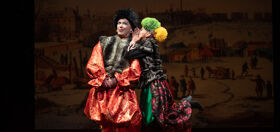 A few months ago I was chatting with a really good friend of mine here in Acapulco, Rubi, about our plans for the following weekend. We were going to hit up Squid Roe, one of our favorite hang-out spots, mainly because another friend is very coqueta with the manager and gets us discounts. This friend told me that a boy she was interested in would also be coming to the bar, so I needed to act, as she put it, hombre.
A few months ago I was chatting with a really good friend of mine here in Acapulco, Rubi, about our plans for the following weekend. We were going to hit up Squid Roe, one of our favorite hang-out spots, mainly because another friend is very coqueta with the manager and gets us discounts. This friend told me that a boy she was interested in would also be coming to the bar, so I needed to act, as she put it, hombre.
She had led this guy to believe that I was her boyfriend in hopes of making him jealous, thus, if I started acting gay, she told me, she would look like a complete idiot. I was very offended by this comment and thought to myself that I would act however I wanted to, regardless of how pendeja she would come across to her love interest. But the whole thing got me thinking, “Was I really not acting hombres?”
For those of you who have studied abroad or learned another language, you’re probably already familiar with the certain liberty it gives you. How many of you (monolinguals) could walk down the street yelling puto or pendejo fully aware it’s a cuss word in Spanish and not think twice about it, but would be reluctant to do the same in English?
In a second language it can be easier to say certain things than in your own native tongue because the inhibitions normally enforced in the latter by the superego are backed by years and years of experience in perceived social no-nos. As for geographically escaping your comfort zone, how many people do you know that have gone wild during Spring Break in a foreign country?
How about we take this to the next level?
Our newsletter is like a refreshing cocktail (or mocktail) of LGBTQ+ entertainment and pop culture, served up with a side of eye-candy.
Being from Tucson, only four hours from Nogales, Sonora, and six hours from Puerto Peñasco, also known as Rocky Point, I certainly have. Here in Acapulco they say that “Los esprinbrekers hacen un desmadre“, which very roughly translates into “the spring breakers go fucking crazy.”
While I’m not on vacation—I’ve been living and teaching English as a second language in a public university for seven months now—I have gone a bit loco myself. I’m not referring to the indecent behavior that the Acapulqueños accuse spring-breaking gringos of engaging in (i.e. public fornication on hotel balconies or in clubs), but to a different definition of loco in Spanish—or in this case, loca. It may refer to a guy who acts very feminine and at times can be used derogatorily within the gay community, perhaps their equivalent to a “flamer.” In this aspect, I believe that living in a different country and, more importantly, communicating in another language has brought out my “inner flame.”
I’ve always been a bit less self-conscious of how I act ever since coming out of the closet, ceasing, for example, to question if the way I was walking or talking was masculine enough. But I believe that living in a different language has pushed me even further towards openly expressing myself, at least linguistically. This may be related to the fact that I spend most of my time hanging out with girls. Even when I lived in Guadalajara for 10 months back in 2006-07, my best friend was a girl, hence I spent most of my time socializing in Spanish with her. Acapulco has not been any different. I think many of us can relate to appropriating girl talk in English in one way or another in order to “speak gay,” and these muchachas have definitely provided me with ample language resources that can be used to partly express my gay identity en Español.
 Rubi and I, for example, greet each other with an “ay sister” (pronounced see-stehr). She says she’s Paris so I guess that makes me Nicky, the prettier one.
Rubi and I, for example, greet each other with an “ay sister” (pronounced see-stehr). She says she’s Paris so I guess that makes me Nicky, the prettier one.
Actually, traditional orthography doesn’t do our salutation justice. It’s more like “aaay siiister,” which of course includes an occasional flip of the hair or wrist. Something tells me that I would be a little more hesitant in doing the same in English, at least in public. Elongation of the vowels can be useful to help mark the word as gay, as in “no lo creeoooooooooo, amiguis” (an emphatic “I don’t think so”) as well as the addition of the suffix -is to nouns or adjectives. Lastly, similar to English, the longer you hold the s, the better, as in “por diossssssss,” basically used as an incredulous “whatever.” This is an adequate retort if, for example, someone tells you they’re more good-looking than you are. Now, of course I don’t mean to insinuate that these are defining characteristics of the manner in which women or gay men speak, but they can be thought of as potential tools for helping to reconstruct gay identities.
This is not to say that my straight-acting alarm has completely shut off. At times I still “tone myself down” if I sense in the vicinity, for example, the presence of a group of machos bearing witness to my joterías (gay shenanigans). And I don’t become loca 100 percent of the time. Nonetheless, that unconscious inner voice that dictates my behavior is a little less strict on me en español, and I think it’s a good thing.
This topic reminds me of a feud between two video bloggers recently featured on Queerty. In a nutshell, it revolved around the issue of masculine and feminine-acting gay men, both groups claiming the status of the stigmatized. The two seem to be forgetting that just like bilingual Spanish speakers who switch between English and Spanish at the drop of a dime, some of us gays can also code-switch moving somewhere along the continuum between “straight acting” and “flaming.” I would venture to say that given the opportunity to follow those two boys in their everyday lives we would observe behavior a bit more multifaceted than any label could suggest and at times contradictory. Identity isn’t something static but changes from situation to situation.
Had Rubi not mentioned anything to me about her crush being there, I probably would have run the gamut jumping between masculine, feminine and everything in between. But since I have been enjoying the license Spanish gives me to act in ways that I would be perhaps more afraid of doing back home, I had only one response to her request for me to butch up: I flipped my imaginary hair in her face and exclaimed, “Ay, por diosss. No lo creeeeoooo…” –Brandon Brewer


















SpWe
Can we have some more of this? This was amazing writing and really insightful.
Jonathan
When I first started working in an Italian restaurant when I was 17, I had a little Spanish and could thus converse with the Mexicans I worked with. When I explained to them that I’m gay, I always used the word “puto” because I didn’t know any other ones, and even though one woman told me I should just say “soy gay”, it seemed too Spanglish for my tastes… Later I realized that to call yourself “puto” can at times genuinely imply that I’m trying to bottom for any given Mexican RIGHT NOW, so I laid off, haha.
A side note: Perhaps in Mexico “loca” means “flamer” or “fruit”, but in Argentina it exclusively refers to a trans person…
Liz
“Living in a different language”. I love that phrase. I will adopt it. It captures the entire geographical, social and linguistic barriers and permissions that you express.
rem
I agree. More articles like this and fewer gay-hotspot travel stories. This ain’t Genre!
rogue dandelion
hehehe this was cute and light.
OMG
I concur. More of this, please. 🙂
Vinman
Really enjoyed!
M st-Jacques
w o w! great article, it made my day! gracias! i totally feel the same way. i am a mexican living in Montréal, Québec, speaking both english and french. i have never felt this happy, i just don’t know if i feel free because of the language or because of the openness of the people, there’s a “gay village”, gay marriage, straight clubs have gay events once a month, etc, i love living abroad, i never want to go back home, ok maybe just for the holidays, hehe
Ian
The trannies in the picture are fierce.
John
“Another language; another soul” I don’t know who said that but its so true
Enrique
So were the guys at the restauran Mexican because they were from Mexico or because they were from south of the us border??
Also it’s is very true… I was born amd raiced ib mexico brought up in a very conservative mexican family (from Mexico LOL) and speaking Spanish (my first lenguage) everything that implies a sexual remark or some enuendo sounds so much dirtier that it does to me in English. Might be because I have my mom and my nana in the back of my head telling me how sucio and cochino I’m.
aaronwonders
Love this article
Juan Pablo
Nice article!
I can say I personally relate to the loca-hombre/English-Spanish analogy.
The “flaming ways” come natural to some but, in my personal experience, they’re more about creating a language that differentiates us from the rest and feels unapologetic.
I usually hang out with straight people but I have a group of gay friends and, when I hang out more often with them, I realize we tend to flame away.
It takes me at least two days to come back to my usual self, having some loca spurts – like when you’ve lived abroad for so long and, the first weeks you’re back in your home country, some words come first in the foreign language. So,
Kip
excellent! I will be back.
Kirsten
This was great! I’m thinking about exchanging in a Spanish speaking country next year and this was really a really interesting perspective! Thanks
Cesar
Wow!!
Congrats Brandon, great article !!!
I can feel the perspective from where you are writing your story…
And I agree… ¨living in a different language” gives a whole new experiencie on the re-construction of the own identities…
I’m happy I followed your example, now I’m in Vietnam… and I don’t wanna go back to Mexico !
Skye M.
@SpWe: agreed!
Rob Moore
It can happen even in different dialects of the same language. I am from England but grew up in the U.S. I speak American English most of the time. When I am visiting my English family, there is a decided difference. My accent and demeanor change. I can tell a joke, but in my American persona, I miss the timing or inflection altogether. It isn’t that I do it consciously, in fact, I have to concentrate to speak with an American accent for the amusement of my cousins’s children.
I rarely thought about it until I watched a documentary film of John Barrowman and saw him do the same thing. With his parents, he slips into a Scottish brogue without effort or thought. Of course, around my mother, I have to be careful. She still will smack me and say “Language!” if I say “bloody” which is a something of a swear word to her generation. Imagine if she had heard me refer to her third husband whom I loathed as a “great bloody fucking twat”.
tarheel1023
a wonderful, refreshing story
Thanks so very much